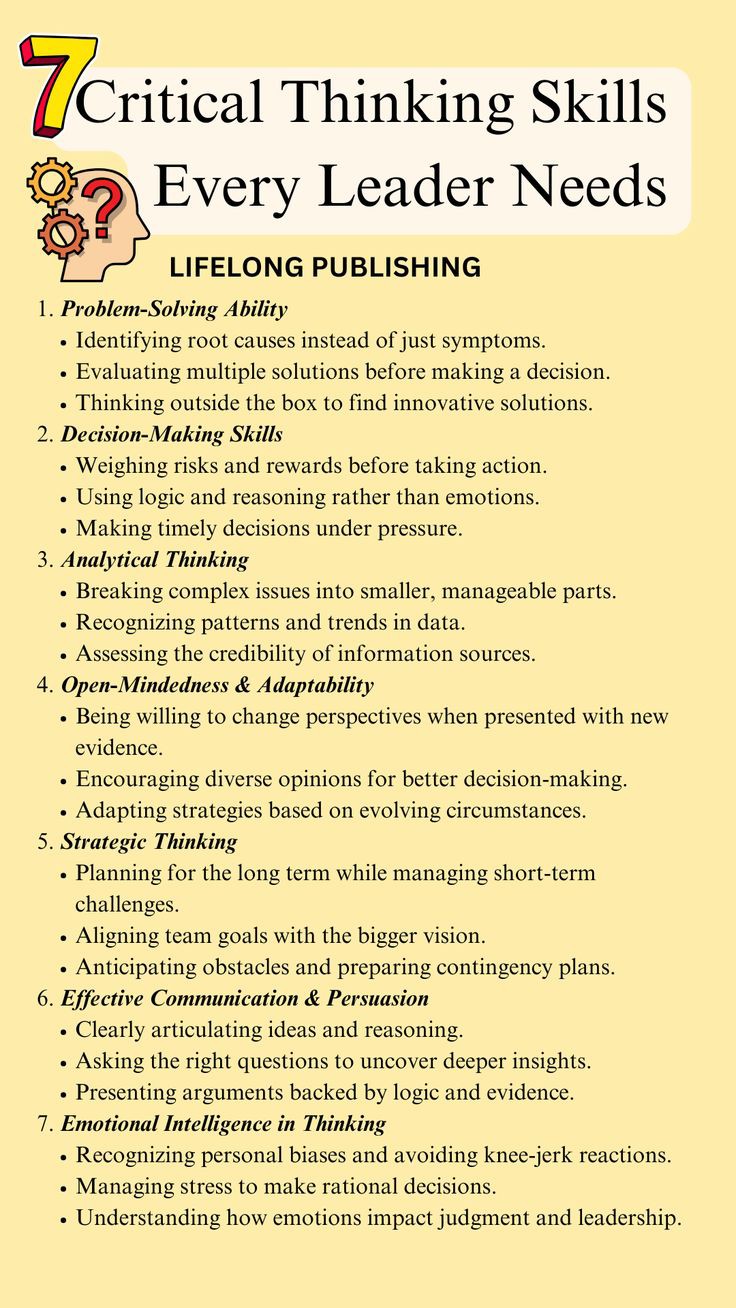
In today’s rapidly changing world, effective leadership requires more than just charisma and vision. It demands a keen ability to analyze situations, solve problems, and make informed decisions. This is where critical thinking skills come into play. They equip leaders with the mental agility to navigate complexity, adapt to unforeseen circumstances, and inspire their teams to achieve remarkable results.

Critical thinking is not merely a desirable trait for leaders; it’s an essential ingredient for success. It’s the mental muscle that empowers leaders to navigate complexity, make sound judgments, and inspire their teams to achieve remarkable results.

Navigating Complexity: Leadership in today’s dynamic world is about navigating a constant stream of information, conflicting perspectives, and rapidly changing circumstances. Critical thinking allows leaders to filter through the noise, analyze data, and identify patterns that reveal the true nature of a situation. This ability to see beyond the surface allows them to make informed decisions, even when faced with ambiguity and uncertainty.

Making Sound Judgments: Leaders are constantly faced with difficult choices. Critical thinking provides the framework for evaluating options, weighing potential consequences, and making decisions that align with their vision and values. It enables them to consider all sides of an issue, identify potential risks and opportunities, and ultimately choose the best course of action.

Inspiring Effective Action: Critical thinking isn’t just about individual analysis; it’s also about fostering a culture of critical inquiry within the team. Leaders who encourage open dialogue, challenge assumptions, and welcome diverse perspectives create an environment where innovation thrives. This collaborative approach to problem-solving empowers team members to contribute their best ideas and work together towards shared goals.

- Time-Saving Templates: Streamline Your Branding Process
- The Ultimate Guide to Choosing the Right Branding Templates
- Branding Secrets: What Makes a Template Convert?
- Unlock Your Potential: Branding Templates for Entrepreneurs
- How to create a detailed marketing budget and resource allocation report
Adapting to Change: The business landscape is constantly evolving, and leaders need to be agile and adaptable to stay ahead. Critical thinking allows leaders to anticipate change, analyze its impact, and adjust their strategies accordingly. By embracing a growth mindset and continuously learning, leaders can ensure their teams are equipped to navigate uncertainty and thrive in a rapidly changing world.

Here are seven critical thinking skills every leader needs:

1. Analysis and Interpretation: Leaders must be able to dissect complex information, identify patterns, and draw meaningful conclusions. This involves breaking down problems into smaller components, examining data from multiple perspectives, and discerning the underlying causes and effects. A leader skilled in analysis can effectively evaluate options, identify potential risks and opportunities, and make well-informed decisions based on a thorough understanding of the situation.

2. Problem Solving: Leaders are constantly faced with challenges, and their ability to solve problems effectively is crucial. This involves identifying the root cause of the issue, generating creative solutions, and implementing them with a clear plan of action. A leader adept at problem-solving can turn obstacles into opportunities, fostering a culture of innovation and resilience within their team.

3. Decision Making: Leaders are responsible for making crucial decisions that impact the entire team. This requires weighing different options, assessing potential consequences, and choosing the best course of action based on available information and strategic goals. A leader with strong decision-making skills can act decisively, confidently, and with a clear understanding of the potential outcomes.

4. Communication: Effective communication is the cornerstone of successful leadership. It involves conveying ideas clearly and concisely, actively listening to others, and fostering open and honest dialogue. A leader skilled in communication can build trust, inspire action, and ensure everyone is aligned towards a shared vision.

5. Creativity and Innovation: Leaders must be able to think outside the box, challenge conventional wisdom, and generate innovative solutions. This involves embracing new ideas, experimenting with different approaches, and fostering a culture of creativity within their team. A leader with a creative mindset can drive innovation, adapt to change, and keep their team ahead of the curve.

6. Strategic Thinking: Leaders need to develop a long-term vision for their team and organization. This involves setting strategic goals, anticipating future challenges and opportunities, and planning for long-term success. A leader skilled in strategic thinking can guide their team towards a shared vision, ensuring they are always working.
In conclusion, critical thinking is the cornerstone of effective leadership. It empowers leaders to make informed decisions, inspire effective action, and navigate complexity with confidence. By developing and nurturing these critical thinking skills, leaders can unlock their full potential and guide their teams towards remarkable success.











Leave a Reply